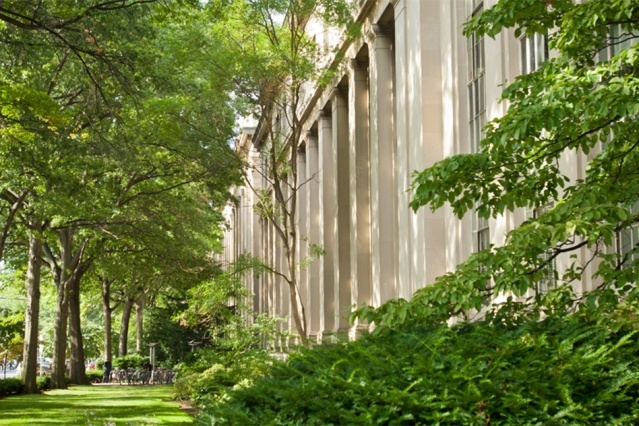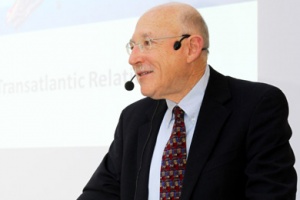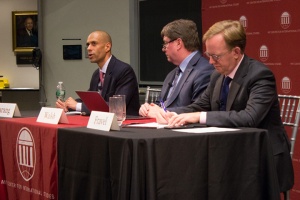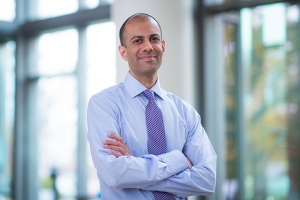MIT School of Humanities, Arts, and Social Sciences and Harvard Kennedy School launch collaborative international studies program
New initiative supported by $3.7 million in grants from the Charles Koch Foundation.

Building 7 on the MIT campus
Image: Patrick Gillooly
The MIT Security Studies Program at the Center for International Studies in the School of Humanities, Arts, and Social Sciences, and Harvard Kennedy School’s Belfer Center for Science and International Affairs launched today a collaborative program to mentor the next generation of foreign policy scholars. The Project on Grand Strategy, Security, and Statecraft is made possible with support from the Charles Koch Foundation: a $1,846,200 grant to MIT and one for $1,853,900 to Harvard Kennedy School (HKS).
MIT Professor Barry R. Posen, the Ford International Professor of Political Science and director of the Security Studies Program, and HKS Professor Stephen Walt, the Robert and Renée Belfer Professor of International Affairs, will jointly direct the program, which will provide pre- or postdoctoral fellowships to young scholars from a variety of disciplines working in the broad area of strategy and statecraft, with particular emphasis on the U.S. and its role in the world.
The Security Studies Program and the Belfer Center have a long-standing commitment to training security experts and publishing relevant research. Fellows in the Project on Grand Strategy, Security, and Statecraft will each spend one year at MIT and one year at Harvard — providing an introduction to the senior security scholars, visitors, and graduate students at both institutions. A joint speaker series will further cement the cooperation between the two programs. MIT will also host visiting scholars from the policy community to better connect scholarship to statecraft.
“So long as there is no world government to protect states from each other,” explains Posen, “conflicts of interest will occur and governments will compete for power and influence. Military force is one tool of this competition. In this environment, the United States and other major powers must mobilize different capabilities and devise effective strategies to protect their home territory and other vital interests, but without jeopardizing their long-term prosperity or compromising core political values.
“The fellows program will build a community of scholars dedicated to fundamental research on the most critical security problems of our time, and to bringing the fruits of that research to public policy," Posen continues. “We greatly appreciate the contribution of the Charles Koch Foundation to this important endeavor, and the foundation’s recognition of the enduring importance of security scholarship.”
According to Walt, “States are more likely to make sound strategic choices and learn from past mistakes if there is a well-informed and wide-ranging debate on these issues. A healthy democracy therefore requires a diverse and well-trained community of independent experts who understand strategy, security, and statecraft and whose work can inform elites and public debates on foreign policy, and especially decisions to use force. Military force and other instruments of national power may be essential to preserving national security, but understanding the limits of armed force and the complex consequences that accompany its use is equally important.”
“The country is in a critical period of self-reflection about its proper role in the world and how the U.S. can best meet its security needs going forward,” said Charles Koch Foundation Vice President William Ruger. “We are excited to support Harvard and MIT’s world-class vision for engaging the next generation of foreign policy scholars as they develop the research and ideas that will inform this discussion.”
In addition, the foundation grants will support the research of graduate students in security studies at both institutions. Taken together, these features of the Project on Grand Strategy, Security, and Statecraft will significantly enhance the connection of the academy to foreign and security policy, and broaden the national security debate to include a more diverse set of views. The Charles Koch Foundation has made similar grants or awards to schools including Notre Dame, Tufts University, the University of California at San Diego, and other prestigious institutions.
SSP News release and application link
Washington Post article


